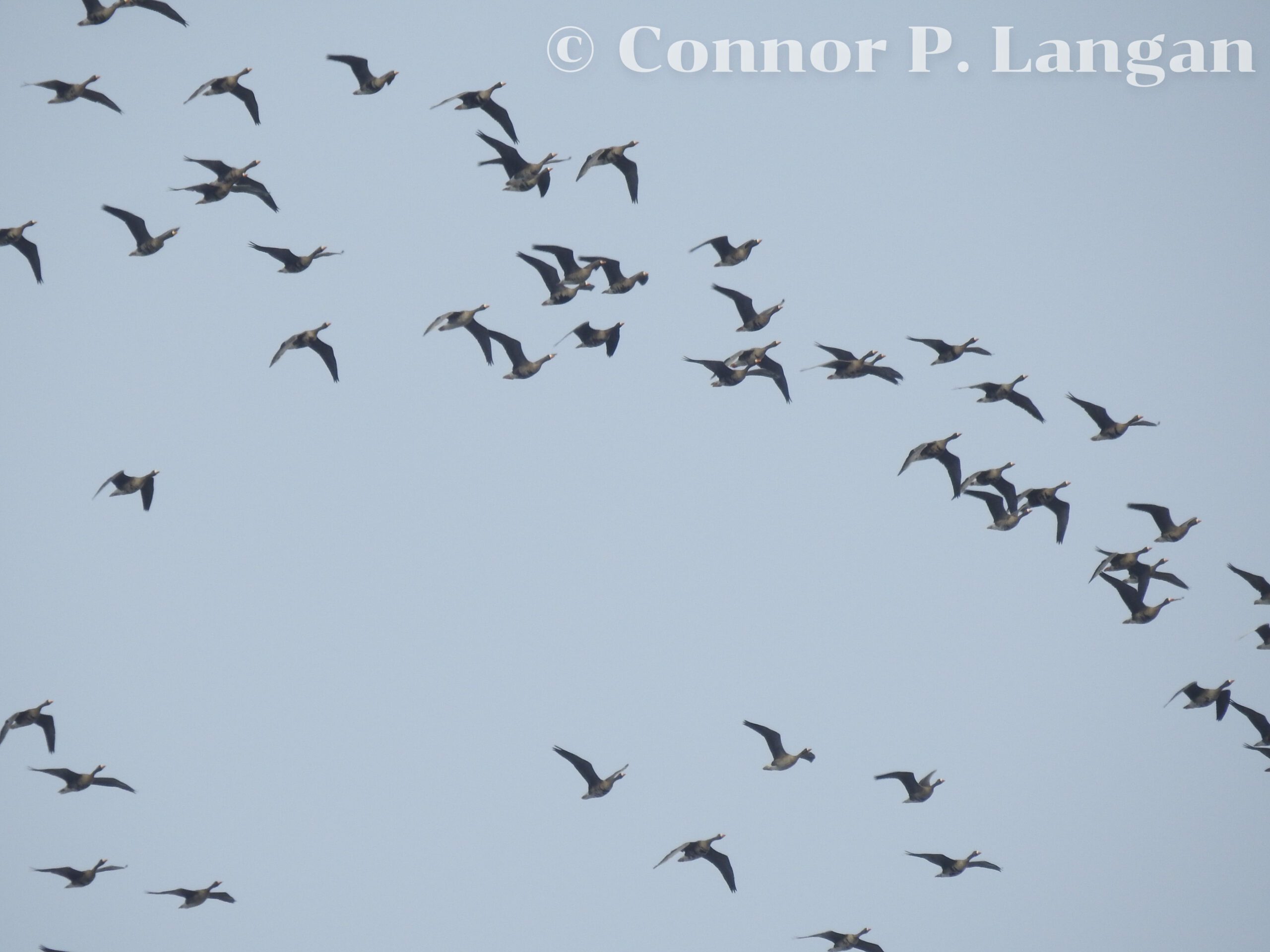If you’ve ever been out for a stroll at night and suddenly heard a goose honking overhead, you may have some questions about their nocturnal tendencies. For instance, do geese fly at night?
Geese do fly at night. While people may not be able to see geese flying at night, you may be able to hear honking overhead on calm nights. The primary reason that geese at night may be flying is because they are migrating.
Table of Contents
Are Geese Nocturnal?
If geese were to be flying at night, one might assume that they are nocturnal. So is this true – are geese nocturnal?
Well, not necessarily. You see, geese are diurnal by nature, but this doesn’t mean that they can’t be active at night. Those who observe geese will notice that they forage, fly, swim, and rest during the day.
Where do geese go at night, you might ask? Well, geese commonly travel to lakes, ponds, and other bodies of water that they feel are safe for sleeping. However, these waterfowl may do more than just sleep during the night.
Okay, so if geese are nocturnal, then why do geese fly at night? Well, let’s investigate!
Okay, now that I’ve confirmed that geese fly at night, you may be curious about why these creatures put themselves through these seemingly dangerous conditions. Why do geese fly at night?

Why Do Geese Fly At Night?
Nighttime flights of geese seem to ramp up in the spring and fall, but these movements can be dangerous. So, why do geese fly at night? Let’s examine the benefits that geese flying at night receive!
Geese Can Eat During The Day
One of the benefits of flying at night is that it allows geese to eat during the day. Although geese are capable of eating at night since they don’t have to worry about capturing live prey like fish, they have a much easier time foraging during the light of day.
If a goose spends its time foraging during the day rather than flying around, then it will have plenty of energy to fly at night. This allows geese to arrive at their breeding grounds and return to their wintering grounds as fast as possible.
Geese Can Avoid Predators
Geese are quite capable of avoiding predators during the day. Whether they’re swimming, flying, or running, geese are nimble birds that can easily escape most predators.
However, geese are not quite as good at avoiding predators at night. Though geese tend to roost in groups, they still have a difficult time detecting some predators that are adapted to nightlife.
Therefore, geese that choose to fly at night avoid the risk of running into predators given that no predator would attack them mid-air at night.
Flying At Night Is Efficient
A final reason that geese may fly at night has to do with the efficiency of the process. Flying at night allows geese to avoid thermals that can make flight challenging during the day. Of course, thermals can be advantageous to bird flight, but they can also impact a bird’s ability to maintain its course.

Geese that fly at night are not as likely to contend with wind, as the wind tends to be more powerful during the day. This means that geese rely on their own power and are less vulnerable to the elements when flying at night.
Thousands of bird species have realized the benefits of night travel. From tiny songbirds like hummingbirds to larger birds such as gulls and waterfowl, night flight is widely utilized.
Do Geese Migrate At Night?
Birds have internal systems that let them know when it is the perfect time to migrate, and geese are no different. Birds key in on external stimuli such as longer days or warming temperatures to know when to migrate.
Looking at geese specifically, birds like the Canada Goose tend to start migrating when ice begins to recede from bodies of water north of their wintering grounds. Geese may begin migrating as early as the start of February in some areas, but do geese migrate at night?
These waterfowl are among the first birds to migrate in the spring and some of the last to migrate in the fall. Geese can afford to start their fall migration in October or November because they don’t have to migrate as far as many of the songbirds that inhabit the Northern Hemisphere.

What Are The Risks Of Flying At Night?
Since we now know the answer to the question “Do geese fly at night?” is yes, you may be wondering about the risks associated with flying at night. Since geese are diurnal birds, do they have any issues with flying at night?
Geese are usually able to fly at night without encountering any problems, but flying at night has its risks. Geese run the risk of running into buildings, utility poles, radio towers, and other obstacles when they fly at night.
It sounds like flying at night–unsurprisingly–comes with its share of risks. Can geese see in the dark to help mitigate these risks?
Do Geese Have Good Night Vision?
Most would assume that geese have mediocre night vision since these birds are adapted to being diurnal. Is this assumption correct – can geese see at night?
As it turns out, geese flying at night possess surprisingly good night vision. Comparisons to human night vision vary, but it is thought that geese have night vision that is at least 8 times better than that of humans. This means that vision may play more of a role in helping geese navigate the darkness than initially thought.
How Do Geese Know Where To Go When Flying At Night?
Migrating during the day is fairly straightforward, as birds can use landmarks and the sun to orient themselves in the proper direction. However, migrating at night is more challenging, so how do geese flying at night do it?
There are several theories that may explain how geese migrate during the darkness of night. Dozens of experiments have suggested that birds learn to orient themselves at night using the stars. In particular, birds seem to key in on the North Star and use it as a basis for north-south migration.
Geese may also be able to use the earth’s magnetic fields to navigate during the night. Several studies have suggested that birds can tap into the earth’s magnetic fields on their migratory journeys. As geese push north during migration, the magnetic signal of the earth intensifies. This could potentially help geese to navigate to their breeding grounds.

Lastly, geese certainly use landmarks to navigate during migration. These migratory birds have a terrific memory of the places that they’ve visited. Therefore, geese can recall specific details about landmarks to help guide them on their migration.
Do All Goose Species Fly At Night?
There are dozens of different goose species, and most of these birds have been observed flying at night. Geese that migrate are especially likely to fly at night, as such birds will want to find a mate and begin breeding as quickly as possible. So, don’t be surprised if you hear the honking of Canada Geese or Snow Geese high overhead at night.
When Do Geese Sleep?
After reading all of this information about the nocturnal habits of geese, you may be wondering about when geese sleep. Geese, like most birds, don’t sleep through an entire night like people tend to do. Instead, geese will take brief naps throughout the night and frequently wake up to check for danger.
Geese often sleep for a few minutes at a time before waking up to assess their surroundings. If geese are sleeping in a large group, they can sleep for longer periods than single geese because they share the responsibility of watching for danger.
In addition to sleeping at night, geese will take naps throughout the day. All of this napping means that geese get a considerable amount of sleep, but not near as much as most humans.
Conclusion – Do Geese Fly At Night?
Now that you’ve read this article, you know that the answer to the question “Do geese fly at night?” is yes. Geese fly during both daytime and nighttime despite being diurnal by nature.
Geese are especially likely to be flying at night during migration, as this is a time when they are scrambling to make long journeys to breeding grounds or winter territory. These waterfowl may use several different ecological adaptations to navigate through the night sky during migration.
Flying at night has its risks, but there are also benefits to be had. Geese have become adept at flying during the darkness of night to get where they need to go.

